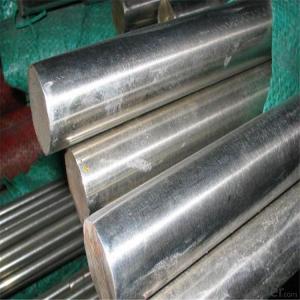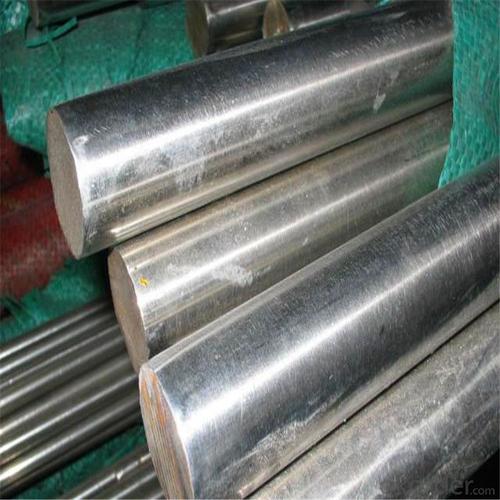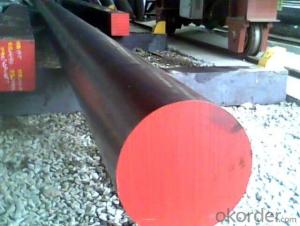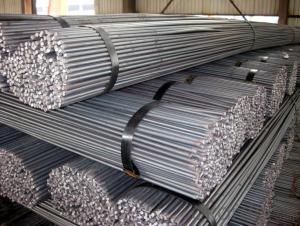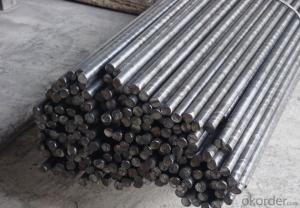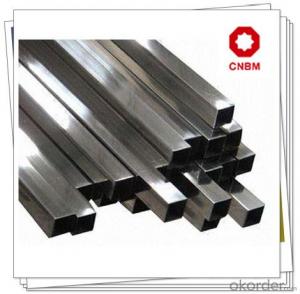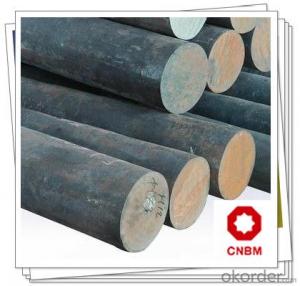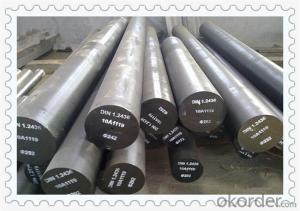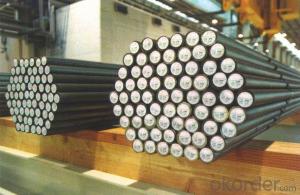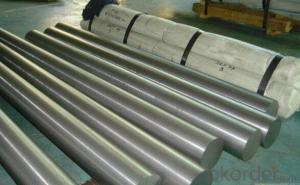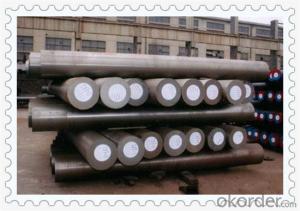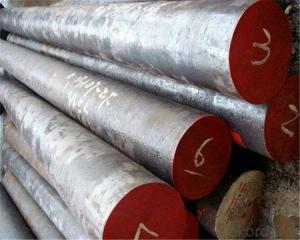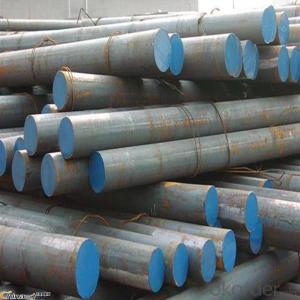40Cr Steel Round Bar&JIS SCR440& ASTM 5140
- Loading Port:
- Tianjin
- Payment Terms:
- TT OR LC
- Min Order Qty:
- 100 m.t.
- Supply Capability:
- 500000 m.t./month
OKorder Service Pledge
OKorder Financial Service
You Might Also Like
Specification
40Cr Steel Round Bar&JIS SCR440& ASTM 5140
Product Description of 40Cr Steel Round Bar&JIS SCR440& ASTM 5140
1. Steel grade: ASTM4140, SCM440, 42CrMo, DIN1.7225
2. Length: 6M-12M
3. Diameter: 16mm-300mm
4. Product range: round bar, flat bar, square bar
5. Technique: Hot rolled, forged, cold drawn
Specification of 40Cr Steel Round Bar&JIS SCR440& ASTM 5140
Material | SCM4140 | Round bar | Dia(mm) | 16-300mm |
Process | EAF + LF + VD + Forged + Heat Treatment (optional) | Length (mm) | Max 12m | |
Heat treatment | Normalized / Annealed / Quenched / tempered | Flat bar | Thickness(mm) | 8-500mm |
Delivery condition | Hot forged +Rough machined (black surface after Q/T)+ Turned (optional) | Width(mm) | 70-200mm | |
Test | Ultrasonic test according to SEP 1921-84 D/d | Length (mm) | Max 12m |
Chemical Composition of 40Cr Steel Round Bar&JIS SCR440& ASTM 5140
C | Si | Mn | Cr | Mo | P | S |
0.38~0.43 | 0.15~0.35 | 0.75~1.00 | 0.8~1.1 | 0.15~0.25 | ≤0.035 | <0.04< td=""> |
Photo Show of 40Cr Steel Round Bar&JIS SCR440& ASTM 5140
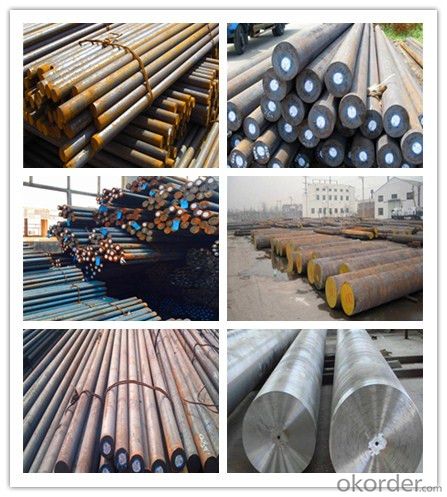
Packing and Delivery:
Packing in bundle package, or as customer's requirements.
Delivery Detail: 45 days after receiving the deposit.
Usage and Applications of 40Cr Steel Round Bar&JIS SCR440& ASTM 5140
1. Steel round bar is used in a large number of architectural and engineering structures. Or it can be used in construction of plants for the production of steel house frames, high-voltage transmission towers, bridges, vehicles, boilers, containers, ships, etc.
2. And we can use this kind of product on the performance of the mechanical parts if the demand is not very high.
3. Some special material steel round bar can be used for main shaft of steamer, hummer shank, with big section and supper force.
Company Information
CNBM International Corporation is the most important trading platform of CNBM group.
Whith its advantages, CNBM International are mainly concentrate on Cement, Glass, Iron and Steel, Ceramics industries and devotes herself for supplying high qulity series of refractories as well as technical consultancies and logistics solutions.


F A Q
1, Your advantages?
professional products inquiry, products knowledge train (for agents), smooth goods delivery, excellent customer solution proposale
2, Test & Certificate?
SGS test is available, customer inspection before shipping is welcome, third party inspection is no problem
3, Factory or Trading Company?
CNBM is a trading company but we have so many protocol factories and CNBM works as a trading department of these factories. Also CNBM is the holding company of many factories.
4, Payment Terms?
30% TT as deposit and 70% before delivery.
Irrevocable L/C at sight.
5, Trading Terms?
EXW, FOB, CIF, FFR, CNF
6, After-sale Service?
CNBM provides the services and support you need for every step of our cooperation. We're the business partner you can trust.
For any problem, please kindly contact us at any your convenient time.
We'll reply you in our first priority within 24 hours.
- Q: How are steel round bars used in the manufacturing of agricultural implements?
- Due to their durability, strength, and versatility, steel round bars are widely used in the manufacturing of agricultural implements. Typically made of carbon steel, these bars offer excellent resistance to wear and tear, making them ideal for heavy-duty applications in the agricultural industry. Plows, an essential tool for breaking up and turning over soil, heavily rely on steel round bars. These bars are used to construct the plow's main framework, ensuring it can withstand the high levels of force and pressure exerted during tilling. Similarly, harrows, which cultivate the soil after plowing, also benefit from the use of steel round bars. These bars provide the necessary strength to withstand rigorous use without bending or breaking, guaranteeing their longevity and effectiveness. Apart from plows and harrows, steel round bars find common usage in the fabrication of other agricultural implements like cultivators, seeders, and sprayers. These implements require sturdy and durable components to endure the demanding conditions of agricultural operations. Steel round bars provide the strength and structural integrity needed for these implements to perform their intended functions effectively. Furthermore, livestock equipment such as gates, fences, and cattle panels also rely on steel round bars. These components must be strong and robust to contain livestock and withstand their movements and force. Steel round bars fulfill these requirements, ensuring the safety and security of animals and the durability of the equipment. In conclusion, steel round bars play a crucial role in the manufacturing of agricultural implements. Their durability, strength, and versatility make them an ideal choice for creating sturdy and reliable equipment that can withstand the demanding conditions of the agricultural industry.
- Q: What are the advantages of using nickel-molybdenum alloy steel round bars?
- One of the main advantages of using nickel-molybdenum alloy steel round bars is their exceptional strength and durability. These bars have a high tensile strength, making them suitable for applications that require resistance to heavy loads and extreme temperatures. Additionally, nickel-molybdenum alloy steel round bars offer excellent corrosion resistance, making them ideal for use in harsh environments where exposure to moisture, chemicals, or corrosive substances is a concern. Moreover, this alloy steel also exhibits good weldability and machinability, allowing for ease of fabrication and customization. Overall, the use of nickel-molybdenum alloy steel round bars can result in long-lasting, reliable, and cost-effective solutions in various industries such as construction, automotive, and aerospace.
- Q: What are the advantages of using phosphorus-alloy steel round bars?
- There are several advantages of using phosphorus-alloy steel round bars: 1. Increased strength: Phosphorus-alloy steel round bars have a higher tensile strength compared to standard steel bars. This increased strength makes them suitable for applications that require greater load-bearing capacity, such as construction and automotive industries. 2. Enhanced corrosion resistance: Phosphorus-alloy steel has a higher resistance to corrosion compared to regular steel. This makes it more durable and long-lasting, especially in environments with high moisture or exposure to chemicals. 3. Improved machinability: Phosphorus-alloy steel has excellent machinability, which means it can be easily shaped, cut, and formed into various designs or structures. This characteristic makes it a preferred choice for industries that require precise shaping, such as manufacturing and engineering. 4. Reduced brittleness: Phosphorus-alloy steel has a lower brittleness factor compared to other types of steel. This means it is less likely to break or fracture under sudden impact or stress, making it a safer option for applications where structural integrity is crucial. 5. Cost-effective: Despite its enhanced properties, phosphorus-alloy steel round bars are still cost-effective compared to other specialty alloys. This makes them a more affordable choice for industries that require high-performance materials without breaking the budget. 6. Improved weldability: Phosphorus-alloy steel round bars have excellent weldability, allowing for easy and secure welding connections. This characteristic makes them suitable for applications that require strong and reliable welded joints, such as construction or fabrication projects. In summary, phosphorus-alloy steel round bars offer increased strength, enhanced corrosion resistance, improved machinability, reduced brittleness, cost-effectiveness, and improved weldability. These advantages make them a preferred choice for various industries where high-performance materials are required.
- Q: What is the resistance to wear of a steel round bar?
- The resistance to wear of a steel round bar can vary depending on various factors, such as the specific type of steel used, its hardness, surface finish, and any protective coatings or treatments applied to it. Generally, steel is known for its excellent resistance to wear and can withstand abrasion and friction quite well. Steel is inherently a durable and strong material, which makes it resistant to wear caused by repetitive or prolonged contact with other surfaces. Its hardness and strength allow it to resist deformation, chipping, or cracking, even under high-stress conditions. This property makes steel round bars suitable for applications that involve heavy loads, constant movement, or abrasive environments. However, it is important to note that the resistance to wear of a steel round bar can still be influenced by external factors. For example, if the steel round bar is exposed to corrosive environments or subjected to improper handling or maintenance, its wear resistance may be compromised. In such cases, corrosion or surface damage can occur, leading to a decrease in the overall resistance to wear. To enhance the wear resistance of a steel round bar, additional measures can be taken. For instance, heat treatments like quenching and tempering can be applied to improve the hardness and strength of the steel, thereby increasing its wear resistance. Additionally, coatings such as chrome plating or nitriding can be used to provide an extra layer of protection against wear, reducing friction and improving the overall lifespan of the steel round bar. In conclusion, the resistance to wear of a steel round bar is generally high due to its inherent durability and strength. However, factors like the specific type of steel, surface finish, coatings, and environmental conditions can affect its wear resistance. Proper selection, handling, and maintenance of the steel round bar can help ensure optimal wear resistance and prolong its lifespan.
- Q: How do you measure the straightness tolerance of a steel round bar?
- To measure the straightness tolerance of a steel round bar, you can use a variety of methods depending on the accuracy and precision required. Here are a few common techniques: 1. Visual Inspection: This is a simple method where you visually inspect the bar for any visible deviations from straightness. You can place the bar on a flat surface and look for any bends or curves along its length. However, this method is subjective and may not provide precise measurements. 2. Straightedge Method: In this method, you place a straightedge, such as a ruler or a precision straightedge, against the bar's surface and check for any gaps or spaces between the straightedge and the bar. This method provides a more accurate measurement but can still be influenced by human error. 3. Dial Indicator Method: This method involves using a dial indicator, which is a precision measuring tool, to measure the straightness tolerance. You secure the dial indicator to a fixed point and then move it along the length of the bar, noting any deviations from a straight line. This method provides more precise measurements and can be used to quantify the straightness tolerance in terms of a specific unit of measurement, such as inches or millimeters. 4. Laser Measurement: Laser systems, such as laser alignment devices, can be used to measure the straightness tolerance of a steel round bar. These systems use lasers to project a straight line onto the surface of the bar and then measure any deviations from this line. Laser measurement provides highly accurate and repeatable results, making it suitable for applications that require tight tolerances. It is important to note that the choice of measurement method depends on the required accuracy, the size of the round bar, and the available resources and equipment. Additionally, it is recommended to consult industry standards and guidelines to ensure compliance with specific tolerances and requirements for your application.
- Q: What are the advantages of using alloy steel round bars?
- Alloy steel round bars offer numerous benefits. Firstly, they possess superior strength and durability, surpassing regular steel bars. This quality is particularly advantageous in industries like construction, automotive, and aerospace, where high strength and toughness are crucial. The inclusion of alloying elements enhances their mechanical properties, making them highly resistant to wear, impact, and corrosion. Moreover, alloy steel round bars exhibit exceptional heat resistance. They can endure high temperatures without compromising their strength, making them suitable for environments like furnaces, boilers, and heat exchangers. This attribute extends their service life and reduces the need for frequent replacements. Another advantage lies in the versatility of alloy steel round bars. They can be easily machined, forged, or welded, providing flexibility in design and manufacturing processes. Their ability to be customized to meet specific requirements makes them suitable for a wide range of applications. Additionally, alloy steel round bars maintain good dimensional stability. Even under extreme conditions, they retain their shape and size, ensuring precise and accurate performance. This characteristic is particularly valuable in industries that demand tight tolerances, such as precision engineering and manufacturing. Lastly, alloy steel round bars prove to be cost-effective in the long term. Although they may have a higher initial cost compared to regular steel bars, their enhanced properties and extended service life result in reduced maintenance and replacement expenses. This makes them a more economical choice over time. In conclusion, the benefits of utilizing alloy steel round bars include superior strength and durability, excellent heat resistance, versatility in machining and fabrication, good dimensional stability, and long-term cost-effectiveness. These advantages make them the preferred option in various industries that require high-performance materials.
- Q: Can steel round bars be used for hydraulic cylinder applications?
- Yes, steel round bars can be used for hydraulic cylinder applications. Steel round bars are commonly used in the manufacturing of hydraulic cylinders due to their high strength, durability, and resistance to corrosion. Additionally, steel round bars can be machined to precise dimensions, allowing for the creation of custom hydraulic cylinder components.
- Q: Can steel round bars be used for tooling applications?
- Steel round bars can indeed be used for tooling applications. Steel is a highly versatile material that possesses excellent strength, durability, and resistance to wear and tear. Round bars made of steel can be machined, heat treated, and shaped to create various tools such as punches, dies, drills, and lathe tools. The round shape of the bars allows for easy machining and shaping processes. Additionally, steel round bars can be further enhanced with surface treatments or coatings to improve their performance in specific tooling applications. Overall, steel round bars are commonly used in tooling applications due to their excellent mechanical properties and adaptability.
- Q: What is the difference between a bright and a rough turned steel round bar?
- The primary differences between a bright turned steel round bar and a rough turned steel round bar lie in their surface finishes and the precision involved in their manufacturing processes. A bright turned steel round bar boasts a sleek and shiny surface finish. This is achieved by subjecting the bar to supplementary processes such as polishing or grinding after the initial turning operation. The bright surface finish not only enhances the bar's aesthetic appeal but also provides improved resistance against corrosion. Conversely, a rough turned steel round bar exhibits a more textured surface finish. It is typically obtained directly from the turning operation without any additional refining processes. The rough surface finish may display visible tool marks and a slightly uneven texture. Regarding manufacturing precision, a bright turned steel round bar tends to be more accurate and precise in terms of its dimensions and tolerances. The additional processes involved in attaining a bright surface finish also enable tighter control over the bar's specifications. As a result, bright turned bars are suitable for applications where precise dimensions and tolerances are crucial. In contrast, a rough turned steel round bar may have slightly looser tolerances due to the nature of the turning process and the absence of further refining operations. Nevertheless, rough turned bars can still meet the requirements of many applications that do not necessitate high precision. Ultimately, the choice between a bright turned steel round bar and a rough turned steel round bar hinges on the specific application and the desired surface finish and precision.
- Q: What is the typical hardness of a steel round bar?
- The typical hardness of a steel round bar can vary depending on the specific grade and composition of the steel. However, most steel round bars have a typical hardness ranging from 20 to 60 HRC (Rockwell Hardness Scale).
Send your message to us
40Cr Steel Round Bar&JIS SCR440& ASTM 5140
- Loading Port:
- Tianjin
- Payment Terms:
- TT OR LC
- Min Order Qty:
- 100 m.t.
- Supply Capability:
- 500000 m.t./month
OKorder Service Pledge
OKorder Financial Service
Similar products
Hot products
Hot Searches
Related keywords
